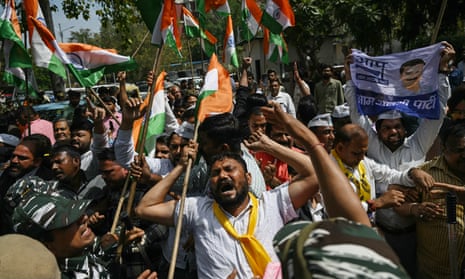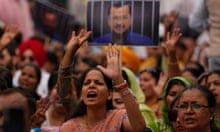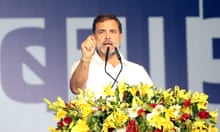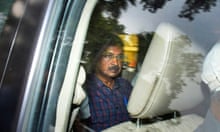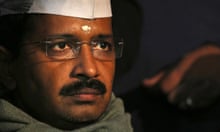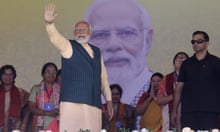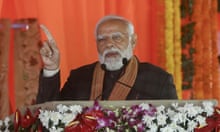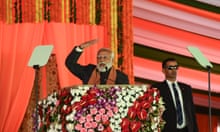The chief minister of Delhi has been remanded in custody for a further four days amid international criticism of his arrest on corruption charges last week.
A Delhi court ruled on Thursday that a powerful central government agency could keep Arvind Kejriwal in jail until 1 April as part of a corruption investigation his party decried as a “political conspiracy” before national elections beginning next month.
Kejriwal – a leading member of an anti-corruption party opposed to Narendra Modi’s ruling Bharatiya Janata party (BJP) – was dramatically arrested last week from his home in the capital, accused of being the “kingmaker” in an alleged scam by his government to get billions in kickbacks from alcohol licensing deals.
It is the first time a sitting chief minister has been arrested. Kejriwal has denied all the charges and accused Modi’s government of targeting opposition parties before the national election beginning on 19 April.
Amid calls from the US state department for the Indian government to ensure there was a “fair, transparent and timely legal process” before the elections and a statement it was “closely watching” events, Dehli swiftly criticised what it said was an unacceptable intervention and summoned senior US diplomat Gloria Berbena to the foreign ministry.
“The recent remarks by the US state department are unwarranted,” said Randhir Jaiswal, the foreign ministry spokesperson, in a weekly briefing on Thursday. “Any such external imputation on our electoral and legal processes is completely unacceptable.”
Kejriwal and his Aam Aadmi party (AAP) government came to power in the capital in 2015 on the back of an anti-corruption movement, and had repeatedly come into the crosshairs of the national government, which has increasingly shown itself intolerant of dissent. The AAP is a member of a 27-person coalition of parties, known by the acronym INDIA, which have come together to oppose Modi and his BJP in the national elections.
The BJP government has been accused of weaponising the enforcement directorate, a powerful financial crime investigation agency under central government control, which has launched dozens of investigations into opposition party members in recent months.
Kejriwal’s deputy chief minister, Manish Sisodia, has been held in jail for more than a year in the same alcohol scam investigation.
Speaking in court on Thursday, Kejriwal called his arrest a conspiracy to crush his party and trap him. He emphasised that none of the alleged 1bn rupees (£9.5m) in bribes to AAP had been uncovered.
Several BJP leaders called on Kejriwal to resign after his arrest but his party vowed that he would continue to govern Delhi from jail.
In Washington, Matthew Miller, the state department spokesperson, also raised concerns over the BJP’s alleged freezing of the accounts of the main opposition Congress party, which party leaders claim has prevented them from being able to fairly campaign in the election.
“We are also aware of the Congress party’s allegations that tax authorities have frozen some of their bank accounts in a manner that will make it challenging to effectively campaign in the upcoming elections,” Miller said. “We encourage fair, transparent and timely legal processes for each of these issues.”

The US has generally been careful in remarks about India, which it sees as a growing partner, despite concerns voiced by rights groups about the country’s direction under Modi’s Hindu nationalist government.
Last week, Germany also raised concerns about the arrest of Kejriwal. The Indian foreign ministry said it had also summoned Germany’s deputy ambassador on Saturday.
Nearly 1 billion Indians will vote to elect a new government in six-week parliamentary elections, which will start in April and go on till June. They are widely expected to return Modi’s government to power for a third term.
India’s foreign ministry rejected allegations that Kejriwal’s arrest was politically motivated before the elections. “India’s legal processes are based on an independent judiciary, which is committed to objective and timely outcomes,” it said.
